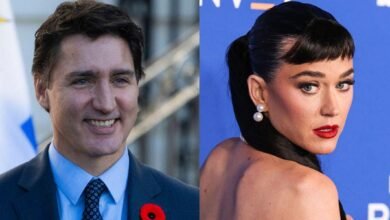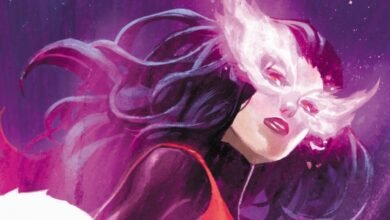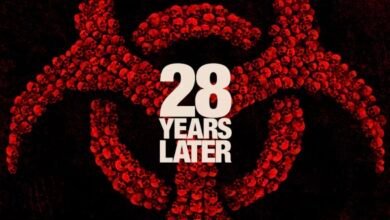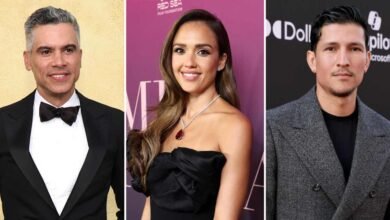12 Comedic Actors With A Dramatic Role That Didn’t Turn Out Very Well
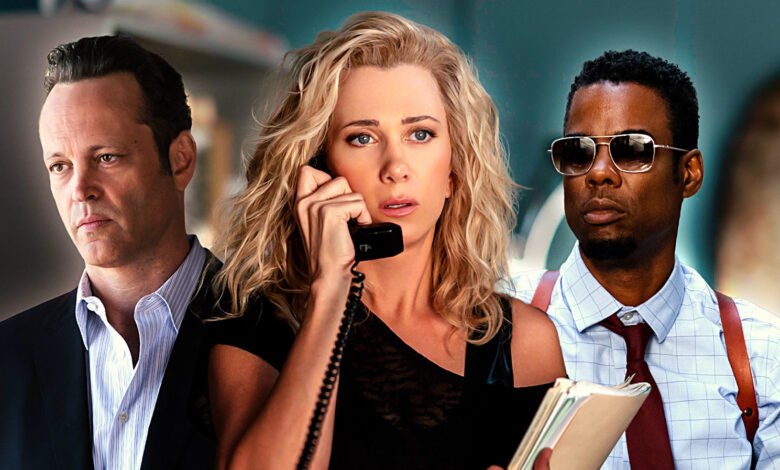
We may receive a commission on purchases made from links.
Every comedian, at one point or another, tries their hand at drama. As much as everyone enjoys a good laugh, no one wants to be typecast in the same kinds of roles throughout their career. Sometimes, it works brilliantly. Take Robin Williams, for example — he used his incredible gift for comedy to become a hugely popular star on both the big and small screens. Then he seamlessly transitioned to drama, appearing in films like “Good Morning, Vietnam,” “Dead Poets Society,” “Awakenings,” and “The Fisher King,” and later went above and beyond behind the scenes to win a well-deserved Oscar for “Good Will Hunting.” While audiences always recognized him for his energetic stand-up routines and comedic performances in blockbusters like “Mrs. Doubtfire” and Disney’s animated “Aladdin,” he still managed to carve out a solid niche as a bankable dramatic star.
There are other examples of legendary comedians balancing their screwball antics with more dramatic fare — think Jim Carrey in “The Truman Show” or Eddie Murphy in “Dreamgirls.” Unfortunately, there are also plenty of times when a comedic actor or actress stumbled on their way to dramatic heights.
All jokes aside, here are 12 comedic actors who tried their hand at drama … and came up short.
Mike Myers – 54
Mike Myers and the 1990s practically go hand-in-hand, and for good reason. The man became a sensation on “Saturday Night Live,” successfully leaped to the big screen with “Wayne’s World” and later “Austin Powers,” and eventually carved a niche in animation with the incredibly popular “Shrek” franchise. Toss in minor hits like “So I Married an Axe Murderer” and a cameo in the hockey comedy “Mystery, Alaska,” and it’s hard to discount the man as anything other than a living legend — just don’t talk about “The Cat in the Hat” or “The Love Guru.”
During this era, Myers also dipped his toes in dramatic waters with 1998’s “54,” a look at the rise and fall of the famed Studio 54, a New York City nightclub known for its wild parties, celebrities, drugs, and sex. Myers portrays the club’s co-owner, Steve Rubell, and actually delivers a pretty solid performance. Regardless, due to last-second studio tampering, the film flopped with critics and audiences, and Myers went down with the ship. Thankfully, in 2015, Miramax released a Director’s Cut that restored director Mark Christopher’s original vision, and even more of Myers’ role.
Had the lengthier version hit theaters in 1998, chances are audiences would have warmed to this side of the star, allowing Myers to flex his dramatic chops a little more and ultimately avoid the disasters that were “The Love Guru” and “The Cat in the Hat.”
Dane Cook – Mr. Brooks
We love Dane Cook as a stand-up comedian, and we can even buy him as a successful dentist pining for Jessica Alba in “Good Luck Chuck,” or as Steve Carell’s fitness-obsessed brother in “Dan in Real Life.” He’s not a movie star, strictly speaking, but he possesses a certain charm that suits him well in specific roles.
Just don’t cast him as a bad guy, à la “Mr. Brooks,” the bonkers thriller where Kevin Costner is a serial killer with an imaginary friend. This 2007 flick strips away everything we enjoy about Cook in an attempt to convince us he’s a sleazy photographer with enough moxie to blackmail Costner’s methodical and compulsive murderer. Yeah, that’s a leap too far for someone with Cook’s bare-minimum acting prowess. He’s meant to portray a dark and twisted character, but his performance walks a fine line between campy and serious and leans too far into cartoonish villainy. You practically expect him to twirl a mustache in most of his scenes.
Cook isn’t a total disaster, but placed opposite legends like Costner and William Hurt, who bring real nuance and gravitas to the film, he sticks out as the weakest link in an otherwise watchable movie.
Vince Vaughn – True Detective
Vince Vaughn is an incredible dramatic actor. Don’t believe us? Check out films like “Brawl in Cell Block 99” and “Dragged Across Concrete,” or earlier efforts in “The Cell” and Gus Van Sant’s “Psycho.” For all the fast-talking, sharp-witted charm he displayed in hits like “Dodgeball: A True Underdog Story” and “Wedding Crashers,” the man clearly possesses a knack for crafting darker, more nuanced characters.
Perhaps that’s why his performance in “True Detective: Season 2” was such a colossal letdown. We know Vaughn can deliver the goods. But for whatever reason, his approach to Nic Pizzolatto’s pitch-black crime drama felt off-key from the start. As career criminal Frank Semyon, Vaughn struggles with Pizzolatto’s philosophical and abstract dialogue, and fails to bring much dimension to an admittedly difficult role; his line readings sound forced, as though he’s reciting poetry rather than having a conversation.
Compared to his co-stars Colin Farrell and Rachel McAdams, Vaughn comes across as emotionally flat, too often defaulting to a clenched-jaw intensity that ends up more laughable than intimidating. Again, it’s not that Vaughn can’t do drama. But at this stage in his career, “True Detective” might have been a case of too much, too soon, and a reason why season 2 ranks as the worst in the series.
Ashton Kutcher – Jobs
There was a time everyone loved Ashton Kutcher. Following his breakout role as the dimwitted Michael Kelso on TV’s “That ’70s Show,” Hollywood tried to morph the young star into the next big thing, casting him in comedies like “Dude, Where’s My Car?,” “Just Married,” “My Boss’s Daughter,” and “Guess Who.” He also headed the MTV comedy reality series “Punk’d,” in which he pranked unsuspecting celebrities, such as Justin Timberlake and Jennifer Love Hewitt, and captured their reactions via hidden camera.
As time went on, Kutcher attempted to expand his scope by starring in dramas like “The Butterfly Effect” and the 2013 biopic “Jobs.” Neither moved the needle on the actor’s dramatic career, but his performance as Steve Jobs was widely reviled as a case of miscasting, despite his resemblance to the famed Apple CEO. Indeed, Kutcher captured Jobs’ physical attributes — notably his walk, posture, voice, and mannerisms — but overall, his performance felt more like an impression than a genuinely nuanced portrayal.
Why? Simple. Kutcher lacked the emotional depth required for such an important role. An underwritten script that fails to dive deeper into Steve Jobs’ psyche doesn’t help, nor does weak direction from Joshua Michael Stern. Compounding matters was the release of Danny Boyle’s far superior picture, “Steve Jobs,” a mere two years later. That film, penned by acclaimed writer Aaron Sorkin and starring Michael Fassbender in the title role, ran laps around Kutcher’s project and all but left it in the dust.
Kristen Wiig – Wonder Woman 1984
Another “SNL” alumnus, Kristen Wiig, seemed destined for big-screen greatness after delivering strong comedic performances in films like “MacGruber” and “Welcome to Me.” In 2011, she hit the jackpot with “Bridesmaids,” earning an Oscar nomination for Best Original Screenplay while showcasing her sharp comic timing and vulnerability as Annie Walker. Since then, however, her career has hit rocky terrain, culminating in the abysmal “Wonder Woman 1984,” the highly anticipated sequel to 2017’s “Wonder Woman,” starring Gal Gadot.
Of course, many of the film’s problems stem from Patty Jenkins’ uneven direction and Warner Bros.’ questionable decision to shift DC’s extended universe away from Zack Snyder’s darker aesthetic toward a more crowd-friendly, Marvel-style tone. So, Wiig can be forgiven for her clunky performance, as she fell victim to an unmitigated disaster. She actually handles the early scenes well, particularly Barbara Minerva’s awkward attempts to fit into society. But her transformation into the villainous Cheetah is far less compelling — and it’s here that her casting feels out of sync with the material.
Wiig lacks the physical presence to be truly menacing, coming across as more cartoonish than intimidating — a shortcoming that feels more like the result of poor writing and direction than her own abilities. In the right dramatic role, as in “The Skeleton Twins,” the aforementioned “Welcome to Me,” and “Hateship Loveship,” Wiig delivers tender, emotionally layered performances. Too bad Jenkins couldn’t figure out how to make her work as Cheetah.
Chevy Chase – Memoirs of an Invisible Man
There was so much potential in “Memoirs of an Invisible Man.” Combining the talents of director John Carpenter and Chevy Chase seemed like a surefire hit — at least on paper. With a strong supporting cast featuring Sam Neill and Daryl Hannah, and an energetic score by composer Shirley Walker, this 1992 thriller is certainly watchable, but it ultimately falls short of its lofty premise and impressive special effects.
The blame falls squarely on a miscast Chase, whose trademark sarcasm and physical comedy don’t mesh with Carpenter’s moodier vision. Audiences hoping for a Chevy Chase comedy in the vein of “Fletch” or the “Vacation” movies will be disappointed by the lack of gags and one-liners, while those expecting another exciting John Carpenter adventure will lament the absence of genuine thrills that made films like “The Thing” and “Starman” so compelling.
As is his specialty, Chase reportedly created chaos behind the scenes, clashing with original director Ivan Reitman, who eventually handed the reins to Carpenter. But nothing improved. Creative differences and studio interference hamstrung Carpenter’s style, resulting in a strange, messy film weighed down by a star simply out of his depth.
Chris Rock – Spiral: From the Book of Saw
Here’s another example of a comedic actor whose strengths are vastly underutilized in a poorly executed film. In this case, Chris Rock stars in “Spiral: From the Book of Saw,” a spin-off that probably didn’t need to happen — then again, you could say that about “Saw II–X.” Regardless, writers Josh Stolberg and Peter Goldfinger conjure up another Jigsaw-esque plot that feels more like a clone of a clone than a novel franchise entry. Essentially, it’s just one more film you may struggle to watch during your “Saw” marathon.
Rock plays Detective Zeke Banks, who is assigned to investigate a series of murders with ties to the now-deceased Jigsaw killer. As the story progresses, Zeke — a disillusioned and perpetually angry cop operating in a corrupt police district — becomes, well, even more disillusioned and angry. Basically, the underwritten character doesn’t give Rock much to work with. He resorts to squinting really hard and occasionally attempting to insert a poorly timed joke into the otherwise morbid affair.
Zeke is meant to serve as our emotional anchor through these dark and treacherous waters, but Rock’s failure to glean anything interesting from the character renders “Spiral” a painfully dull and forgettable entry in the franchise.
Owen Wilson – Behind Enemy Lines
It’s hard to imagine a casting director sitting in an office, reviewing Owen Wilson’s filmography circa 1996–2000 — including titles such as “Bottle Rocket,” “Armageddon,” “Shanghai Noon,” “Meet the Parents,” and “Zoolander” — and concluding that he was the perfect man to star opposite Gene Hackman in the war thriller “Behind Enemy Lines.” Wilson is an outstanding actor in his own right; a sturdy mix of cool with just the right amount of aloofness, and has enjoyed a lucrative career based entirely on his ability to make people laugh and, in films like “Marley and Me,” make people cry.
Wilson tries hard to elevate the material in “Behind Enemy Lines,” but he’s about as believable in the role as Arnold Schwarzenegger as a ballerina. We appreciate Wilson’s attempt to step outside his comfort zone, but as his later career proved, he’s much better in comedies layered with shades of drama — à la “The Royal Tenenbaums” and “Midnight in Paris” — where he can play a slightly different variation of himself. Thankfully, this brief detour didn’t derail his career — though doing so might have spared us from “Zoolander 2,” so… pick your poison.
Amy Schumer – Thank You for Your Service
It feels like Hollywood has been trying to make Amy Schumer a thing for decades, casting her in everything from TV’s “30 Rock” to the 2015 comedy “Trainwreck,” with mixed results. By 2017, the powers that be figured it was time to give her a shot at drama and dropped her into the war film “Thank You for Your Service,” in which she plays Amanda Doster, the widow of a soldier. She only appears in one scene — one very crucial scene — and is meant to deliver an emotional plea that provides closure to the story.
Not only does her random appearance — and we do mean random — pull you out of the movie at a pivotal point, but her line delivery fails to hit the required emotional beat. In short, it’s a painfully cringey moment that feels out of place in an otherwise powerful film and undercuts the drama.
Schumer would go on to earn accolades for her dramatic performance in “The Humans,” so we’ll chalk up her bit in “Thank You for Your Service” as a case of testing the waters before taking the plunge.
Will Ferrell – Melinda and Melinda
After conquering “SNL” and making the leap to the big screen with comedies like “Austin Powers: International Man of Mystery,” “Zoolander,” “Old School,” “Elf,” and “Anchorman,” Will Ferrell decided to try his hand at a more dramatic-ish role by starring in Woody Allen’s “Melinda and Melinda.” Sounds like a match made in heaven, right? Eh, not so fast.
As Hobie, the struggling actor and romantic lead in the “comic” half of the film’s narrative, Ferrell takes on the typical Woody Allen protagonist role: Neurotic, self-deprecating, insecure, and questioning life at every turn. Ferrell gives it an earnest shot, but his broad comedic sensibilities clash with Allen’s need for a quieter, more nuanced performance to bring out his witty dialogue. That’s not exactly Ferrell’s forte, as he’s largely known for his big, absurdist, over-the-top style, leaving this particular collaboration feeling more awkward than relatable.
Don’t cry too hard for Ferrell, though. A few years later, Ferrell would star in the underrated “Stranger Than Fiction,” a project that truly let him dial up his dramatic meter. He followed that with 2010’s “Everything Must Go” and the 2020 vehicle “Downhill,” with mixed results. A better showcase of his acting chops arrived in 2022’s “Spirited,” a modern-day take on “A Christmas Carol.” Here, Ferrell sings, delivers his usual manic energy, but also enjoys several dramatic beats that show what he’s capable of when matched with the right material.
Bill Murray in The Razor’s Edge
Bill Murray is a living legend, so we’re hesitantly including him on this list if only to point out that even the greats sometimes trip over their ambition. With 1984’s “The Razor’s Edge,” the actor made an about-face from the comedy fare that shot him to fame and left him feeling “radioactive” — namely “Caddyshack,” “Stripes,” and “Ghostbusters” — and immersed himself in a slow, ponderous, philosophical character study that failed to resonate with critics or audiences.
Murray stars as Larry Darrell, a disillusioned World War I veteran who sets out on a quest for spiritual meaning. His journey takes him to Paris and India, where he navigates former lovers, endures tragedy, and ultimately finds peace, resolving to live a life worthy of the sacrifice that saved him.
Based on the novel by W. Somerset Maugham, “The Razor’s Edge” never quite takes off, primarily due to Murray’s inability at the time to convey subtlety or emotional depth. Like so many comedians who try their hand at drama, Murray tries so hard not to be funny that he comes across as flat and detached. His deadpan persona reads more as disinterest than profundity, leaving audiences with no one to connect with over the film’s sluggish 129-minute runtime.
Fortunately, Murray didn’t abandon his quest for drama, eventually starring in classics such as “Groundhog Day” (for which he suffered for his art) and “Lost in Translation,” which showcased the incredible range he would master later in his career.
John Belushi – Continental Divide
Like Bill Murray in “The Razor’s Edge,” John Belushi’s performance in “Continental Divide” was too much, too soon for the talented comedian. In an alternate timeline, chances are Belushi would have figured out how to merge his manic persona with tenderness and vulnerability, paving the way for a late-career surge — much like Murray’s — filled with dramatic content.
Sadly, Belushi died in 1982, just as his career was really taking off, leaving “Continental Divide” as his only foray into a proper dramatic or romantic leading role. Honestly, he’s not terrible, but the film asks him to tone down his brash personality in the latter half, when his character, Chicago reporter Ernie Souchak, falls for a reserved, nature-loving scientist (Blair Brown). This shift was something Belushi hadn’t yet shown he could fully pull off. As a result, his romantic scenes with Brown come across as awkward and unconvincing, and his charm lacks the sincerity the story requires.
For a better example of Belushi switching gears and tackling darker material, check out “Neighbors,” an offbeat comedy co-starring his “Blues Brothers” pal Dan Aykroyd. While far from perfect, that film at least allows Belushi to do his thing, with a few moments of quiet reflection mixed into the broad comedy — a baby step in the right direction, as it were. Or skip them both and enjoy a screening of Steven Spielberg’s chaotic comedy masterpiece “1941” instead.
Don’t miss more hot News like this! Click here to discover the latest in Entertainment news!
2025-07-30 12:10:00

